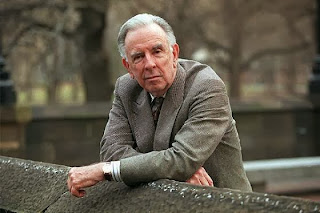Sherrill Milnes and Carlisle Floyd share with us their memories of New York City Opera, thoughts on NYCO’s closing and advice for opera companies moving forward.
Sherrill Milnes – “I did three years (at NYCO) 1964-5 and ’66 and then I came back a couple of times as a guest, sang in Beverly’s farewell, I did Hamlet with Fabrizio Melano directing and Julius Rudel conducting. And the last thing there was the Falstaff they did for me.
My debut was Faust the part of Valentin, in the old City Center before the NY State Theatre, in the Masonic Temple on 56thstreet fall of ‘64. Norman Treigle was Mephistopheles. Well Norman never sang out in rehearsals. He always marked down the octave, sometimes two octaves because he had a huge low voice. It was an old production. Valentin is killed in a sword fight in the opera and I’m lying on a bier, dead. Norman comes up behind me making an entrance in that scene and sings the word Mort, Death, on a middle C, which in his voice was just enormous and I had never heard him full voice but here he sang full voice and I know my dead body jumped. I felt it. It scared me, the sound. He came up by my head and sang it right by my ear. Dead people aren’t supposed to jump obviously.
 Carlisle Floyd – “My first association with City Opera was in the fall of 1956 when I came up from the South to New York to assist in the professional premiere of my opera, SUSANNAH. (I played the orchestral reduction at the piano for all the rehearsals, thereby continuing to be a part of the opera’s life!) What I remember most vividly was vigor and energy and everyone in high spirits. There was a palpable esprit in the Company which I loved being part of during the time I was there. Also, one felt a commitment to the mayor’s notion of a People’s Opera and, with that, a commitment on the part of such singers as Norman Treigle, to the idea of an ensemble theater.
Carlisle Floyd – “My first association with City Opera was in the fall of 1956 when I came up from the South to New York to assist in the professional premiere of my opera, SUSANNAH. (I played the orchestral reduction at the piano for all the rehearsals, thereby continuing to be a part of the opera’s life!) What I remember most vividly was vigor and energy and everyone in high spirits. There was a palpable esprit in the Company which I loved being part of during the time I was there. Also, one felt a commitment to the mayor’s notion of a People’s Opera and, with that, a commitment on the part of such singers as Norman Treigle, to the idea of an ensemble theater.
My feelings on the closing are incredulity, anger and deep regret. For me and many others, New York City Opera ceased to exist as soon as it left Lincoln Center and became a small touring group. That concept for an opera seemed to me from the beginning as being untenable, and certainly untenable for a Company with the reputation and past of City Opera. I felt that a move to the old City Center on 55th Street would have been a much more reasonable solution.
The Company died when it no longer had a home of its own and the ideal of a People’s Opera no longer existed. It seems incredible that this could have happened when one considers the healthy companies in Houston, Seattle, Miami, Philadelphia, Milwaukee and San Diego, among so many others, larger and smaller. The demise of City Opera has to be laid at the feet of its management and board since the blame can logically be laid no where else. I had an email just the other day from the General Director of a mid-sized company in the mid-west telling me jubilantly that his company for the past year had ended with a surplus. That, I feel sure, could be duplicated in any number of cities, and failing companies are usually identifiable because there are so few of them in relation to those that are continuing to flourish.
My advice to any Boards or General Directors of troubled companies is to compare their operations with those companies which are conspicuously successful and see where the differences lie. The one thing that is shared among companies, thanks to such an organization as Opera/America, is the willingness to discuss mutual successes, mutual problems, and solutions. I’m in the twilight of my career now but I still remember vividly those years when I was first associated with City Opera (which really means the fifty seven years which have passed since the premiere of SUSANNAH), for that once estimable Company has produced four of my operas over that span of years. What has been thrilling for those of us who are still here and can still take that long look, is to see the proliferation of new companies over those years, with new smaller companies still emerging. What is enraging in that same look is seeing the demise of a company as vital and alive as the New York City Opera was for so many wonderful years, and is no longer.”
Related Links:
New York City Opera, Kickstarter and the WTF Moment
A Drag Party on the Deck of the Titanic: The US Premiere of Anna Nicole (NYCO at BAM)
Bourbon, Chocolate and Opera: The Savannah Voice Festival 2013



Thank you for this excellent post!
Thank you! And thank you for reading!
Milnes was always a great artist, gracious to his colleagues, and his story on Treigle was wonderful. I saw Treigle and Sills in the FAUST Corsaro production, and they were spectacular in 1970 when I was still in high school @ City Opera.